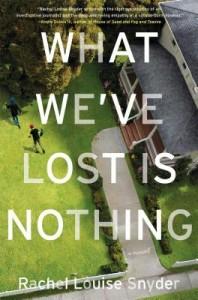 Title: What We’ve Lost Is Nothing
Title: What We’ve Lost Is Nothing
Author: Rachel Louise Snyder
ISBN: 9781476725178
No. of Pages: 320
Genre: Fiction
Origins: Scribner
Release Date: 21 January 2014
Bottom Line: Quiet but provocative
Synopsis:
“Nestled on the edge of Chicago’s gritty west side, Oak Park is a suburb in flux. To the west, theaters and shops frame posh houses designed by Frank Lloyd Wright. To the east lies a neighborhood still recovering from urban decline. In the center of the community sits Ilios Lane, a pristine cul-de-sac dotted with quiet homes that bridge the surrounding extremes of wealth and poverty.
On the first warm day in April, Mary Elizabeth McPherson, a lifelong resident of Ilios Lane, skips school with her friend Sofia. As the two experiment with a heavy dose of ecstasy in Mary Elizabeth’s dining room, a series of home invasions rocks their neighborhood. At first the community is determined to band together, but rising suspicions soon threaten to destroy the world they were attempting to create. Filtered through a vibrant pinwheel of characters, Snyder’s tour de force evokes the heightened tension of a community on edge as it builds toward one of the most explosive conclusions in recent fiction. Incisive and panoramic, What We’ve Lost Is Nothing illuminates the evolving relationship between American cities and their suburbs, the hidden prejudices that can threaten a way of life, and the redemptive power of tolerance in a community torn asunder.”
Thoughts: There are two stories at play within What We’ve Lost Is Nothing. There is the story of the home invasions and their aftermath. This involves the residents of Ilios Lane as they search for answers and closure to a situation that left them all feeling vulnerable and violated. That they live so close to the border between posh and dangerous escapes no one and adds fuel to their indignation. The other story is Oak Park itself and its push for diversity. As all of the residents struggle to make sense of the series of invasions, the push for diversity comes under intense scrutiny. Those who once prided themselves on tolerance and acceptance find themselves battling familiar prejudices having to do with skin color and economic status. These two stories intertwine and intersect but remain distinct from each other, as they both force readers to hold up a mirror and search for one’s own hidden biases.
The force of What We’ve Lost Is Nothing is not its characters. Most of the characters are archetypes, serving the purpose of fulfilling the necessary roles needed in such emotionally fraught circumstances. Names and other details get lost in the action, and one finds that it is not necessary to remember the name of the prejudicial father or kind-hearted older man, the immigrant family on the corner, the young couple still under Daddy’s tutelage, and the not-so-young couple parting ways. They are there to service the story and nothing more.
The stories themselves are surprisingly quiet. There is action, but not as much as one might want or anticipate. The true action occurs internally, as each character works to find meaning in what happened and work through the issues brought up by the lack of answers. For readers, it is a cerebral experience more than an intensely emotional one.
What We’ve Lost Is Nothing serves as a stark reminder that snap judgments serve nothing, and that a situation or a person is always more complicated than it may initially seem. The audacity of the daytime home invasions are shocking, but the residents’ reactions towards their fellow neighbors and others offering help is the truly disturbing part. The unspoken, unrecognized prejudices do more to damage the community of Oak Park than any of the more overt biases. Yet, there is a modicum of hope underwriting the story, highlighting the idea that those championing change and tolerance will eventually succeed. It is this lightness against the dark occurrences and reactions on Ilios Lane, which allow readers to stick with this rather quiet and provocative novel.
